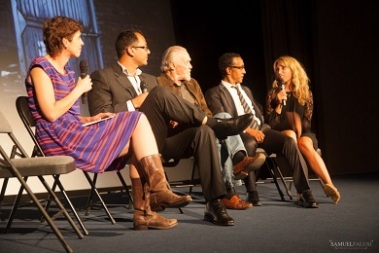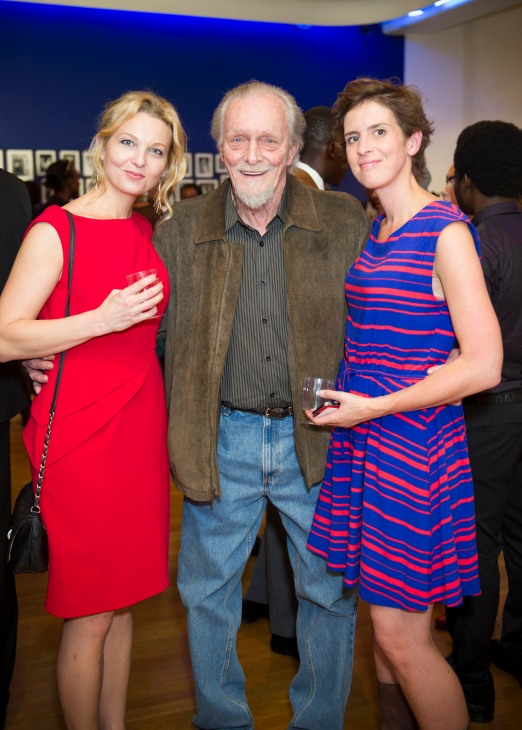
BUFF Tidings! And what a great time of the year
it is to be at the pictures. Christmas round the corner, Oscar-bait
movies ten-a-penny, what’s not to like? Digital distribution perhaps?
We’ll save that for next month’s blog. At the time of writing, yours
truly will be in attendance at a pre-Christmas preview screening of ’12
Years A Slave’ – it’s one of the perks of running a film festival though
one could say the same thing about this month’s guest writer of the
BUFF blog. Those of you who follow the festival will either recognise
the name Larushka Ivan-Zadeh or indeed her profile picture in the Metro –
and that’s because not only is she the film editor for that newspaper,
she’s also one of our esteemed board members meaning that she gets to
see a vast cornucopia of films – mostly on your behalf. So why should
she have this privilege you may ask? Why should you care what she thinks
about a big-budget movie or otherwise? Well there’s only one way to
find out? Read her BUFF blog right here…

Why does anyone care what film critics think? The
answer increasingly seems to be: they don’t. For 2013 marks the year the
professional (i.e. paid) critic became an endangered species. The cull
that started in the US finally arrived in the UK. Increasing numbers of
my colleagues in the mainstream press have been axed, retired or told
they can only continue if they take massive pay-cuts. Obviously I think
this is a bad thing. But is it? What are we losing here? And what is the
role of a film critic anyway?

In the old, pre-Internet days seeing the point of a
film critic was simpler. We were news-bringers and gate-keepers. A
hatchet job critique can be an entertaining read, but, as a force for
good, we helped – and still do help – to introduce audiences to new,
often challenging work. But then, so do film festivals. BUFF is a
shining example. It provides a valued platform to filmmakers whose work
can struggle to be heard in the mainstream media. Festivals are a chance
for audiences to see films unprejudiced by reviews, marketing slants or
hype. BUFF-goers don’t use reviews to choose what to see – indeed they
can’t, as some of the films in the programme have never been screened
anywhere before. So what’s the role of a critic at festivals? To
acquaint themselves on the cutting edge of film making, to spread the
word of what they’ve seen outwards and to take the critical temperature
of how the film is likely to be received outside the supportive and
nurturing festival nest.

It is at festivals we see that critics, industry
and audiences share a level playing field. Often a festival will have an
‘Audience’ award as well as an award voted for by a jury. Filmmakers
will value both, but also the praise or constructive criticism of the
professional reviewer. Why? Because what differentiates the professional
reviewer, as well as, hopefully, a skill for insightful analysis, is
that they give an informed context for their opinion. One based in an
extensive knowledge of cinema and wider film history. Added to that is
the fact we see a heck of a lot more movies than you do. I see about 6
new films a week, for example.
That said, criticism is subjective. And no critic
is an ultimate authority. Film festivals, more than anywhere, are where
critical objectivity can fly out the window. At Cannes, for example,
passions run particularly high: films are routinely booed or given
standing ovations and this is reflected in the reviews. Here, even
broadsheet critics can over-excitedly shower films with stars that, if
viewed outside the festival hothouse, they might have appraised more
coolly.
So, why should you trust a critic to tell you
if a film is any good, or not? Studios are starting not to. Posters may
still have critics’ star ratings on them as a badge of pride – but
tweets from ‘normal’ punters have begun to be used on publicity, even
for ‘serious’ dramas like the Oscar-nominated ‘The Impossible’ which
opened earlier this year. You can see why marketing companies would use
quotes from the public when advertising big, so-called ‘critic-proof’
multiplex crowd-pleasers – the films that we critics insist are rubbish
and give no stars to, but audiences still flock to in their millions.
But, even so, who are these random Tweeters on the posters? What weight
does their opinion hold? You could probably find a Twitter-user who
loved the Diana movie if you looked hard enough.

Thanks to social media the phrase ‘everyone’s a
critic’ has never been truer. Anyone can set up a reviews site online
and shout their opinions – as long as they don’t expect to be paid for
it. Which is great for non-elitism. And, on the upside, social media has
proved a revolutionary facilitator in allowing independent filmmakers
to create a word-of-mouth buzz for their films without the need for a
prohibitively expensive marketing campaign. But, to me, the professional
critic still has a role. To me, a critic is a guide. A guide you may
not always agree with, but who entertains you, occasionally enlightens
you and one whose opinion you respect. A guide who is comprehensive, who
has the time to see everything from tiny festival movie to massive
blockbuster and, ideally, give them equal consideration. To do that
properly is a full time job – and should be valued with a living wage.
And in our non-stop, ever-expanding media Babel, a guide is more
essential than ever. But then I would say that, wouldn’t I?
© Larushka Ivan-Zadeh
Follow @Larushka_iz on Twitter.
For all the latest BUFF breaking news follow @buffenterprises on Twitter.






